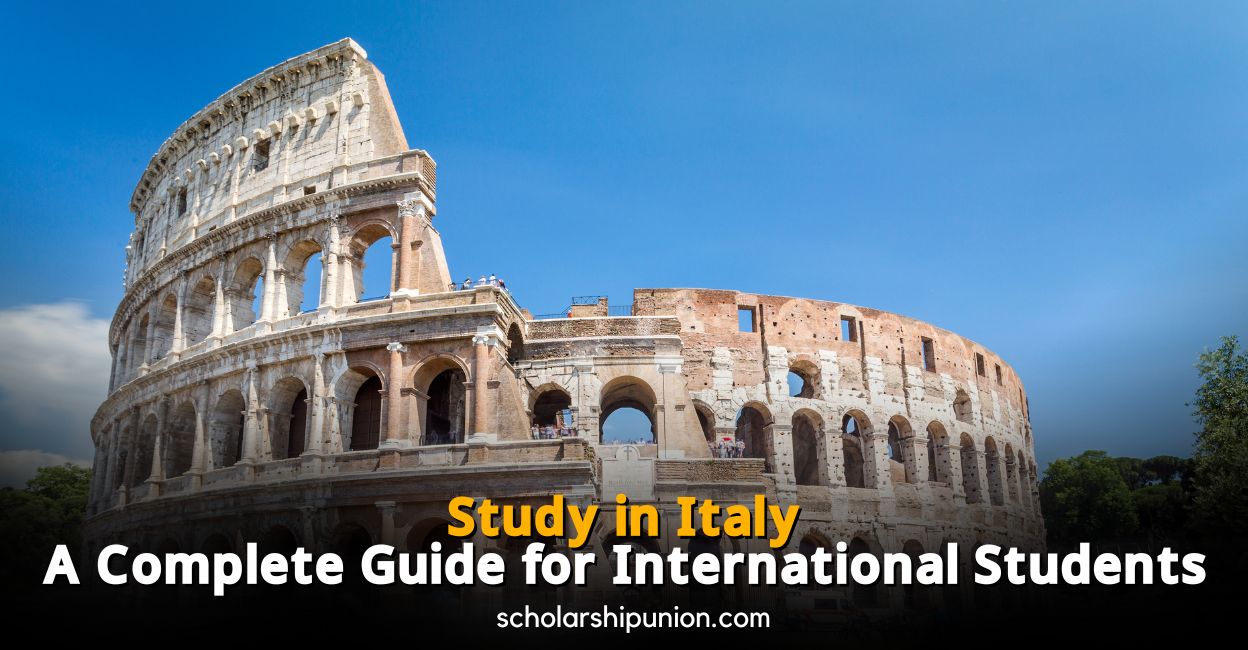How to Study in Italy: A Complete Guide for International Students
Thouhedul Islam
25 October 2024
887 views

Italy is an exciting destination for international students, blending rich cultural history, world-renowned universities, and affordable living. With prestigious institutions like the University of Bologna, Italy offers quality education in fields ranging from art and humanities to engineering and sciences. Whether you're drawn by the idea of studying in historic cities or the affordable tuition, Italy can be a rewarding place to pursue higher education.
Why Study in Italy?
- High-Quality Education: Italian universities like Sapienza University of Rome and the Politecnico di Milano rank highly worldwide, providing a solid foundation for academic and professional success.
- Affordable Tuition Fees: Compared to other popular study destinations, Italy offers relatively low tuition fees and affordable living options, making it accessible to a wide range of students.
- Diverse Programs in English and Italian: Italy is known for its variety of study programs, many of which are offered in English, especially at the postgraduate level. For those wanting to immerse themselves, learning Italian offers additional opportunities and experiences.
Types of Degrees and Programs Available
- Undergraduate Programs: Italy’s undergraduate programs are typically three years long and cover a range of subjects from humanities to engineering.
- Graduate Programs: Master’s programs usually last two years, and Italy offers renowned programs in business, design, technology, and more.
- Italian Language Courses: While English programs are available, learning Italian can be beneficial, especially if you plan to work in Italy post-graduation. Many universities offer introductory Italian courses for international students.
Eligibility Criteria
- Academic Requirements: Admission to undergraduate programs generally requires a high school diploma or equivalent, while master’s programs require a recognized bachelor’s degree.
- Language Requirements: Most programs in Italian require proof of language proficiency, usually via an Italian language test. For English programs, students must provide IELTS or TOEFL scores as specified by their chosen university.
Application Process
- Finding a Program: Use the Universitaly portal, which lists Italian university programs, or check individual university websites.
- Required Documents:
- Transcripts: High school or undergraduate transcripts.
- Language Proficiency Proof: IELTS, TOEFL, or Italian language test results.
- Statement of Purpose: Describe your goals and motivation for studying in Italy.
- Letters of Recommendation: From teachers or employers who can vouch for your academic and professional abilities.
- Application Deadlines: Italian universities usually have two application cycles, with deadlines in January for fall admission. Be sure to check with the specific university to confirm dates.
Visa Process for International Students
- Student Visa Requirements:
- Apply for a Type D visa, the long-term study visa, from your home country’s Italian embassy or consulate.
- Required documents include your acceptance letter, proof of financial resources, health insurance, and accommodation details.
- You can find more details on the Italy Visa Portal.
- Residence Permit: Within eight days of arrival, students must apply for a residence permit (“permesso di soggiorno”) at a local post office. This is mandatory for all non-EU students staying longer than 90 days.
Scholarships and Financial Aid
- Government Scholarships: Programs like the Invest Your Talent in Italy scholarship offer financial aid for students in specific fields. The Erasmus+ program also provides support for EU and some non-EU students.
- University Scholarships: Many Italian universities offer their own scholarships based on merit or need. Check with your chosen university’s website for specific scholarship opportunities.
- External Scholarships: Scholarships are also available through organizations like the Italian Ministry of Foreign Affairs. These are highly competitive, so apply early to improve your chances.
Cost of Living in Italy
- Accommodation: Costs vary depending on the city; expect to pay between €300-€700 for a shared apartment. Rome and Milan are pricier, while Bologna and Florence tend to be more affordable.
- Transportation: Monthly passes for public transport are typically around €35-€55, with discounts available for students.
- Food and Other Expenses: Budget around €200-€300 for groceries and dining. Italy’s markets and affordable eateries make it easy to stick to a budget while enjoying Italian cuisine.
- Part-Time Work: International students are allowed to work up to 20 hours per week, which can help cover living expenses and give them valuable work experience.
Life in Italy as an International Student
- Italian Culture and Language: Embrace the Italian way of life by learning the basics of the language, which helps in daily interactions and exploring the country.
- Student Life and Networking: Most universities have clubs and associations for international students, which makes it easy to meet people, participate in events, and make lasting connections.
Post-Graduation Opportunities
- Stay Back Options: Italy offers a temporary stay-back visa (typically 6–12 months) after graduation for job searching. This can be extended if you find employment.
- Job Market and Industries in Demand: Italy’s job market values graduates in fields like engineering, fashion, business, and tourism. EU residency allows for easy movement within the European Union, providing even broader career opportunities.
Conclusion
Studying in Italy offers a unique blend of culture, academic excellence, and affordability, making it an excellent choice for international students. With diverse programs, ample scholarship options, and access to EU post-graduation opportunities, Italy provides a comprehensive and rewarding experience for those looking to broaden their horizons and invest in a global education.
For further information and to explore specific programs, visit the Italian Ministry of Education or university.